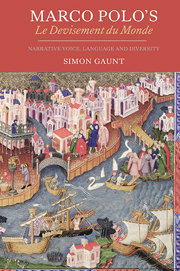Book contents
- Frontmatter
- Contents
- Illustrations
- Acknowledgements
- Abbreviations and a note on citations and editions
- Introduction: Le Devisement du Monde: textual tradition and genre
- 1 Narrative voice and style: ‘ego Marcus Paulo’
- 2 Language and translation: ‘in lingua Galica dicitur’
- 3 Knowledge, marvels and other religions: ‘oculis propriis videt’
- 4 Diversity and alterity: ‘diversarum regionum mundanas diversitates’
- Conclusion: et ipse non notavit nisi pauca aliqua, que adhuc in mente retinebat
- Bibliography
- Index
- Already Published
1 - Narrative voice and style: ‘ego Marcus Paulo’
Published online by Cambridge University Press: 05 September 2013
- Frontmatter
- Contents
- Illustrations
- Acknowledgements
- Abbreviations and a note on citations and editions
- Introduction: Le Devisement du Monde: textual tradition and genre
- 1 Narrative voice and style: ‘ego Marcus Paulo’
- 2 Language and translation: ‘in lingua Galica dicitur’
- 3 Knowledge, marvels and other religions: ‘oculis propriis videt’
- 4 Diversity and alterity: ‘diversarum regionum mundanas diversitates’
- Conclusion: et ipse non notavit nisi pauca aliqua, que adhuc in mente retinebat
- Bibliography
- Index
- Already Published
Summary
The aim of this chapter is to examine the ambiguous narrative voice(s) of the Devisement. The ambivalence of first-person pronouns in the text has not escaped remark before, and my own analysis is indebted, in particular, to articles by valeria Bertolucci Pizzorusso, Dietmar Rieger and cesare segre. I hope, however, that my own discussion can go further than previous studies by relating the fundamental ambivalence of first-person pronouns to broader issues of storytelling and reader response as they emerge not only in the narrative frame of the Devisement itself but also in the text's reception. This chapter has three sections. In the first I will examine the text's striking and insistent use of first-person forms, consider how this relates to the equally striking and insistent references by name to Marco Polo himself and then how different versions handle and rework their source's narrative voice. In the second I will look at how narrative voice impacts upon and relates to the representation of space and time both in the reader's apprehension of the world the text describes and in his or her engagement with the text itself. In the final section I will consider how the text's insistence on Marco Polo's role, not just as an observer but as a teller of tales about the world, affects how readers respond to Marco Polo as a figure in the text, as the text's author and as a real-life, or possibly fictional, traveller, something that in turn impacts upon the text's role as a purveyor of knowledge about the world.
- Type
- Chapter
- Information
- Marco Polo's Le Devisement du MondeNarrative Voice, Language and Diversity, pp. 41 - 77Publisher: Boydell & BrewerPrint publication year: 2013

